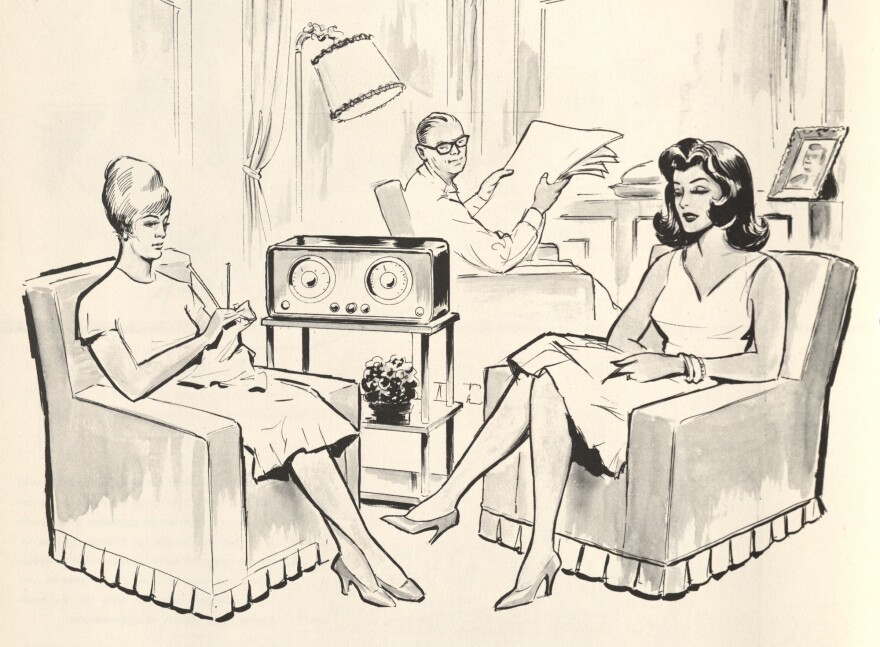Binge-worthy podcasts may be a 21st century phenomenon, but addictive, serialized storytelling is nothing new. From the 1930s through the 1950s, Cuba exported more daytime and nighttime radio serials than any nation in the Spanish-speaking world — even Fidel Castro was a fan.
After the Revolution, Cuban emigrés in Miami began making original Spanish-language radio soap operas — better known as radionovelas — that reportedly ran on more than 200 stations worldwide. The Latin American Library at Tulane University is now digitizing a whopping collection of those 1960s-era programs and encouraging academic study of Cold War soaps.
Library director Hortensia Calvo, who acquired the collection for Tulane, says the stories and the manner in which they were promoted to radio stations throughout Latin America reveal a nascent middle class searching for a new way to live. Many of the programs were aimed at housewives and the frequent breaks in the action allowed advertisers to pitch all manner of household and luxury items.
The plot twists in these radionovelas kept audiences tuning in for more. Ida Schooler knows that better than anyone: Her job is to binge more than 1,000 hours of this 1960s-era must-hear entertainment.
Sometimes it's really dated and you kind of groan, and you have to just accept that it is of its time. But then sometimes it's really timeless and feels really modern.
Schooler is an associate archivist at the library who grew up speaking Spanish in Mexico. She's been listening to these soaps for about a year, and she says some hold up better than others. "Sometimes it's really dated and you kind of groan, and you have to just accept that it is of its time," Schooler says. "But then sometimes it's really timeless and feels really modern."
The Latin American Library is paying Schooler to help catalogue its collection with support from the Council on Library and Information Resources and the Mellon Foundation. "We're trying to find scholars to research them," Schooler says. "But my first thought is these would be great to listen to on a car ride — if I'm going on a road trip — or if I'm learning Spanish."
From 1963 to 1970, America's Productions Incorporated made more than 130 Spanish-language serials. Located in the historic Freedom Tower in Miami, the company hired displaced Cuban writers, directors, actors, musicians and engineers. Schooler is piecing together their names and resumés. It takes a lot of detective work.
"All we have is based on listening to things over, and over, and over, and sort of observing what are logical conclusions we can draw," she says.
Perhaps the best-known actor in the radionovelas was Minín Bujones — the Lucille Ball of Cuba. Tulane's massive collection of radionovelas — more than 9,000 reel-to-reel tapes — is named after Bujones and her husband, Louis Boeri, an Italian-born American businessman who founded America's Productions Incorporated.
Boeri is a bit of a mystery. Before the early 1960s, Boeri had never made a radionovela. He was a magazine publisher in Florida. In the final years of the Batista regime, he took a job with the Cuban government to promote U.S. investment and tourism there. But when Fidel Castro rose to power and partnered with the Soviet Union, Boeri left his home and fortune in Havana and relocated to Miami. Schooler says Cuban actors had cultivated a rare skill — the ability to speak "Continental Spanish."

"It would be the equivalent to the Trans-Atlantic accent," Schooler says. "So they'd figured out a way to alter their voices so that it was not region specific and it wasn't class specific."
Boeri's family suspects he worked for a U.S. intelligence agency. A daughter — Zenia Robertson — says she remembers him taking a lot of flights to Washington, D.C. That may be why Cold War politics seem so evident in these radionovelas. The protagonists openly embrace democratic and capitalist ideals. But no one says exactly who, or what they are fighting against.
"They don't want to say 'Communists', so the big sub-in is always 'The Existentialists,' " Schooler says. "So in multiple series you'll have like, 'It was the kind of bar where Bohemians and students and Existentialists hang out.' And they'll talk about Sartre and his philosophy."
Some of the radionovelas were pure propaganda, made to counter the ideals of the Cuban Revolution. But the serials for commercial radio were not so dogmatic — they managed to be both ideological and thrilling.
Christine Hernández, who oversees special collections at the library, is particularly drawn to the action-adventures, which often mirror world affairs in the 1960s. But then, who doesn't like a good espionage story, set against the backdrop of exotic world capitals and state-of-the-art gadgetry? Hernández says the radionovela producers made the Cold War fun and profitable, featuring entertaining heroes, "chasing down some evil doer who's going to destroy the world."
The Latin American Library plans to have the first third of its collection of radionovelas available for online research by December. Then Ida Schooler will have another 2,300 hours of audio to go.
Boeri once said that in his radionovelas "The American way of life shines, but without saying so." That's the definition of soft power — or in this case, soap power.
Copyright 2019 WWNO - New Orleans Public Radio







